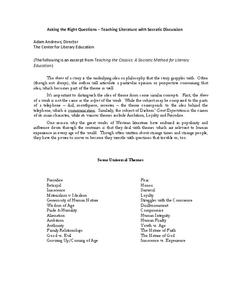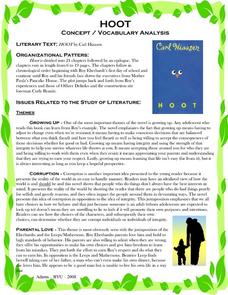Smithsonian Institution
Water/Ways: The Poetry of Science
Water is the source of life. It appears in poetry in both peaceful and torrential descriptions; it appears in earth science in its liquid, gaseous, and solid states. Combine these interpretations of our planet's most precious and...
Sundance
Teaching Strategies: The Giver
Can utopia be achieved? Included here are three literature worksheets to pair with Lois Lowry's The Giver. Pupils work in groups to come up with solutions to society's issues, individuals back up a statement related to a topic in the...
Core Knowledge Foundation
Sixth Grade Poetry
Study some of the most prominent poets and works of poetry in history with a language arts poetry unit. From Virgil to Shakespeare to Dickinson to Angelou, the resources present biographies and examples of poetic elements to the sixth...
Curated OER
Introduce Vocabulary: A Picture Book of Abe Lincoln (Adler)
The story of Abe Lincoln serves as the backdrop to this vocabulary-in-context activity as you read David Adler's A Picture Book of Abraham Lincoln. Scholars learn these politically themed words before listening to you read the story...
Writing Educators Symposium
Asking the Right Questions
It can be difficult to find the theme of a book or story if you don't know the questions to ask. Teach your kids to discern the universal theme in works of literature with a set of activities that promote critical thinking and active...
Curated OER
Agriculture Awareness Through Poetry
Whether you are viewing a landscape painting of a farm, examining a still-life portrait of a bowl of fruit, or reading a descriptive poem about cultivating food, you can't deny that agriculture plays a major role in visual and language...
Thoughtful Education Press
Compare and Contrast
Encourage readers to compare and contrast the information that they find in informational text with a variety of reading passages and worksheets. Learners read all about subjects in science, social studies, and literature before...
Fluence Learning
Writing Informative Text: Did Shakespeare Write Shakespeare?
William Shakespeare penned some of the richest and most fascinating works of literature—or did he? Middle schoolers read three brief informative passages and conduct additional research to evaluate the claim that Shakespeare did not...
Curated OER
Rediscovering Forgotten Women Writers
Women's voices are becoming more prominent in the world of literature, but for centuries, this wasn't the case. Young historians research a woman whose writings are considered to be lost, out of print, or forgotten. They develop an oral...
Curated OER
Interpreting Perspective
Work on characterization with a narrative writing lesson, in which middle schoolers interpret a character's perspective. They discuss family traditions and examine how culture can influence a character's perspective. Next, they read...
Curated OER
Character Impressions
Whether you are planning a unit on F. Scott Fitzgerald's The Great Gatsby, or simply want to improve your pupils' descriptive writing, this lesson could be a good addition to your class. Using the Six-Trait Writing process, pupils use...
Curated OER
Hoot: Concept/Vocabulary Analysis
Augment your unit on Carl Hiaasen's Hoot with a series of activities about the environment, civil disobedience, making an impact in the world, and growing up. A list of literary concepts and themes helps you to write your lessons to...
Novelinks
The Little Prince: Concept/Vocab Analysis
Focus on the literary elements of Antoine de Saint-Exupéry's The Little Prince with a concept analysis sheet. With suggestions and explanations for many of the book's concepts, vocabulary, and other issues that may arise in instruction,...
Bolton Healthy Schools
Deal with Poetry
The stated goal of this unit is to use poetry to "improve the emotional health of young people." Budding poets read and then supply their own lines for poems that deal with alienation, loneliness, and rejection.
ReadWriteThink
Beyond the Story: A Dickens of a Party
It's time to party like it's 1899! Incorporate a research-based celebration of the Victorian Era into your unit on A Christmas Carol by Charles Dickens. After learners read the novella or view a production of the play, they craft a...
EngageNY
Analyzing How Literature Draws on Themes from the Bible and World Religions: The Golden rule (Chapter 3)
Scholars use their Golden Rule Note-catcher to examine passages from To Kill a Mockingbird. They then take a gallery walk to compare and contrast the quotes before sharing Think-Write-Pair-Share ideas on how the quotes demonstrate the...
Novelinks
Walk Two Moons: Anticipation Guide
Before you begin a unit on Sharon Creech's Walk Two Moons, introduce class members to the literary themes of the book with an anticipation guide. As they read through ten sentences that address different aspects of the plot, learners...
Roald Dahl
The Twits - The House, the Tree and the Monkey Cage
A house with no windows and a garden full of stinging nettles make the perfect home for Mr. and Mrs. Twit. The seventh activity in an 11-part unit designed to accompany The Twits by Roald Dahl takes a closer look at the Twits' home...
Roald Dahl
The Twits - Muggle-Wump Has an Idea
If a bar of chocolate was on the floor, would you try to pick it up? What if it was covered with glue? The eighth lesson in an 11-part unit designed to accompany The Twits by Roald Dahl has scholars imagine crazy scenarios. The lesson...
Houghton Mifflin Harcourt
One Land, Many Trails: Challenge Activities (Theme 5)
Bring history to life through literature. The first in a series of three challenge activities designed to accompany Theme 5: One Land, Many Trails does just that through unique projects connected to historical fiction and nonfiction...
Roald Dahl
James and the Giant Peach Lesson Plans
Immerse yourself in the world of giant bugs, rolling peaches, and brave little boys with an interdisciplinary unit on James and the Giant Peach. Young readers focus on the scientific themes of Roald Dahl's classic novel with bug hunts,...
Literacy Design Collaborative
The Scarlet Letter and Hester Prynne
Is Hester Prynne a virtuous woman? To conclude a unit study of Nathaniel Hawthorne's The Scarlet Letter class members craft an argument essay in which they use the standards listed in Proverbs 31 from the Bible to judge Hester's virtues.
K20 LEARN
Voices from the Past: History and Literature
Art can enhance the understanding of history. That's the big idea in a lesson that has young scholars read Randall Jarrell's poem "The Death of the Ball Turret Gunner" and an excerpt from John Hersey's Hiroshima, which provide a...
Curated OER
Johnny Appleseed
Students engage in a study of apples using children's literature. They conduct research using a variety of resources. Student list facts about apples and compare them while answering some guided questions. They plant some apple seeds and...

























